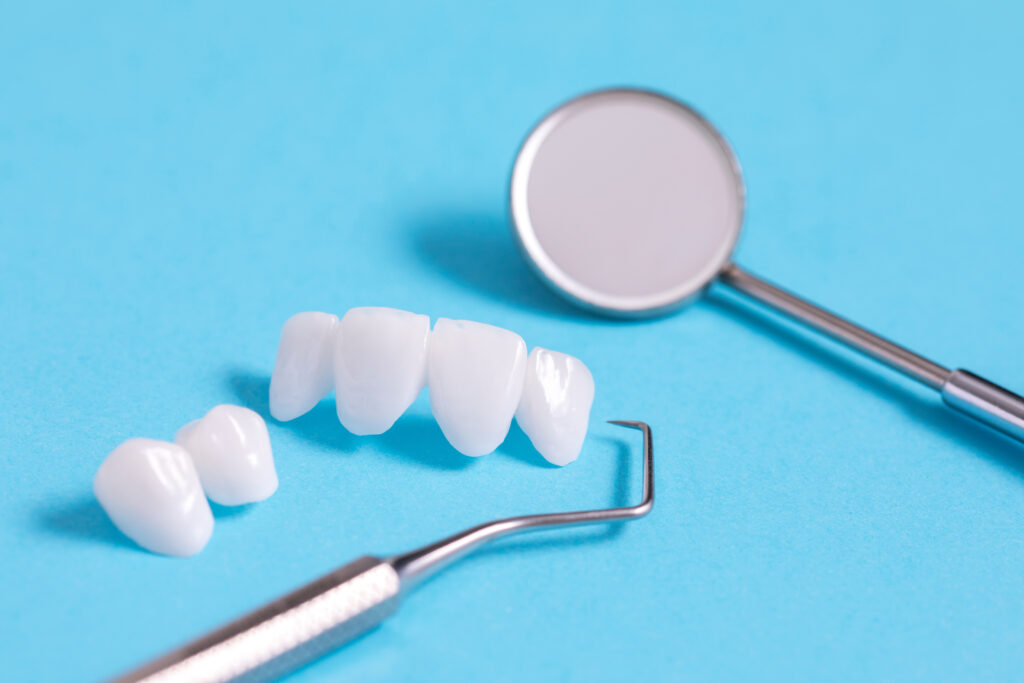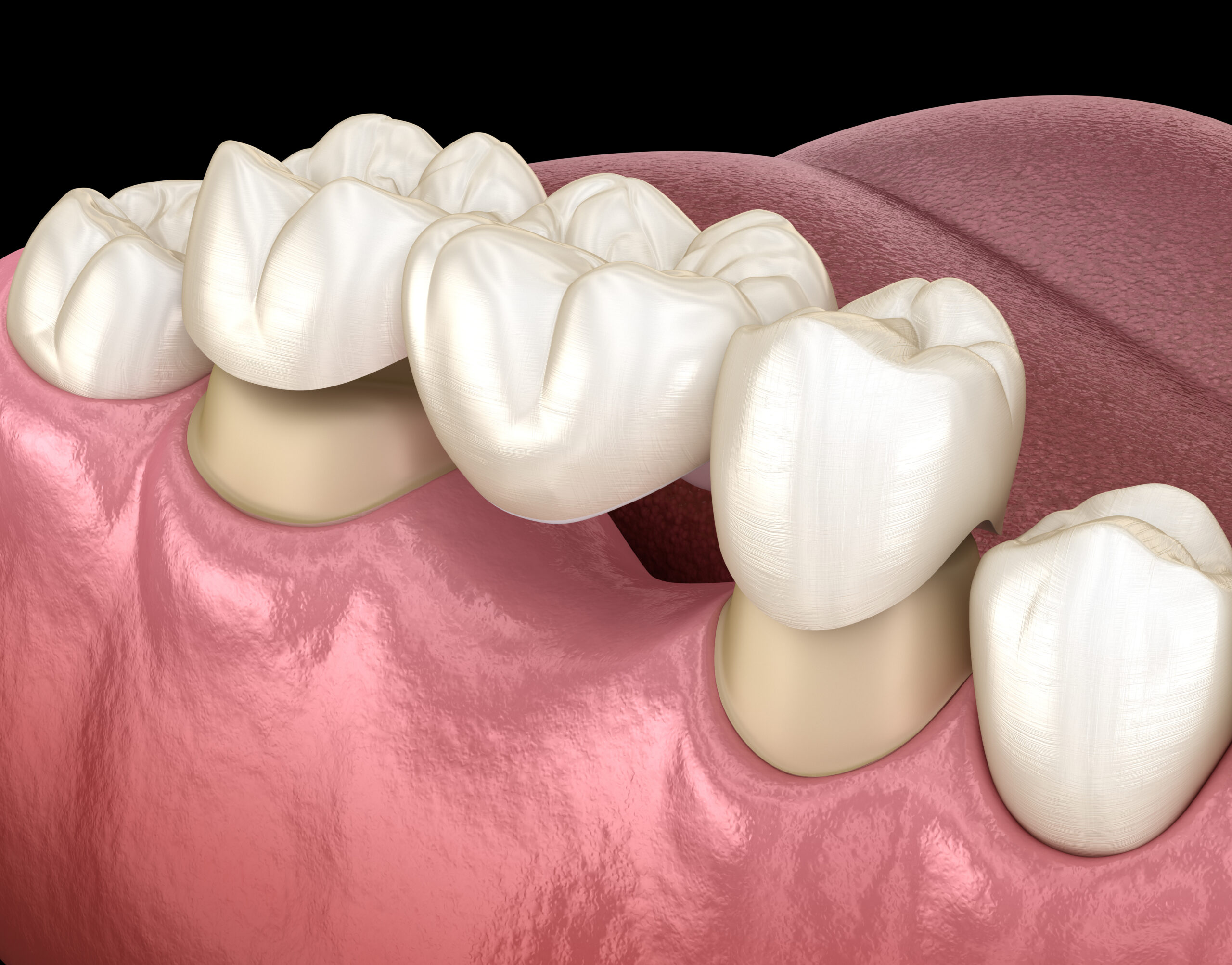(801) 212-9061
7555 Center View Ct Suite 104 West Jordan, UT 84084
Dental Bridge Treatment in West Jordan

Dental bridges are a form of restorative dentistry used to replace one or more missing teeth. They consist of two or more crowns for the teeth on either side of the gap (these two or more anchoring teeth are known as abutment teeth) and a false tooth/teeth (bridge) in between. At Platinum Dental of West Jordan we are able to provide this procedure and restore your smile.
If you have any questions or are ready to schedule a consultation, give us a call today at (801) 212-9061
Dental bridges play a crucial role in restoring both the function and appearance of your smile.
It’s important to understand that missing teeth are more than just a cosmetic issue. Missing teeth will have a damaging impact on your oral health affecting everything from your bite, to your facial structure and even your ability to get the nutrition you need. Dental bridges can prevent teeth from shifting and maintain proper jaw alignment providing years and even a lifetime of health.

Each patient’s dental needs are unique, which is why it’s essential to understand the various types of dental bridges available.
The four most common bridge options are:
- Traditional bridges are suitable for replacing one or more missing teeth.
- Cantilever bridges are ideal for situations where there is only one adjacent tooth.
- Maryland bridges are a conservative option for replacing front teeth.
- Implant-supported bridges offer unmatched stability and longevity.
The three steps to dental bridges:
- Consultation– we will discuss all the options that are available and work together to decide the best course of treatment for your health and your budget.
- Preparation– Next we will prepare the area for the bridge to be installed. We will numb the area for comfort and then clean the area missing the tooth. Then the teeth nearby are shaped to support a bridge properly. We will then put in place a temporary bridge while a custom bridge is prepared.
- Installation– At your final appointment we will install the customized bridge and make sure it fits perfectly before sending you home with a renewed smile.
Proper care and maintenance are essential to extend the lifespan of your dental bridge. We’ll provide you with detailed aftercare instructions. This will include brushing and flossing techniques to keep your bridge and surrounding teeth healthy and free from plaque buildup. Regular dental check-ups will also be emphasized as an opportunity for our dental team to monitor the condition of your bridge and address any concerns promptly.
Common Concerns
Will my dental bridge be durable?
While dental bridges are generally successful and durable, there are possible risks, such as bridge failure or discomfort, this is uncommon, and our experienced dental team is always ready to address these issues and respond quickly to help ensure your long-term satisfaction and oral health.
Common Misconceptions
- Misconception: Dental bridges are uncomfortable and cause pain.
- Correction: While some patients may experience mild discomfort or sensitivity after getting a dental bridge, it is usually temporary and can be managed with over-the-counter pain relievers. Modern dental techniques and materials ensure that dental bridges are designed to fit comfortably and blend seamlessly with your natural teeth, allowing you to speak and eat without any discomfort once you adjust to the restoration.
- Misconception: Dental bridges require special care and maintenance.
- Correction: Dental bridges do not require any extra care, regular oral hygiene practices are enough. Our dental team will provide you with personalized aftercare instructions to ensure you know how to care for your bridge properly, and with diligent maintenance, your dental bridge can last for many years.
Beyond restoring your smile, dental bridges have broader implications for your overall oral health. Replacing missing teeth with dental bridges can improve your ability to chew and speak effectively, enhance your self-confidence, and positively impact your social and professional interactions.
If you have questions about dental bridges, or believe dental bridges are right for you contact us to set up an appointment at (801) 212-9061.
Our Services:
Frequently Asked Questions
Dental tooth bridges are prosthetic devices used to replace missing teeth by bridging the gap between two adjacent teeth. They consist of a false tooth (pontic) held in place by dental crowns attached to the neighboring teeth.
Dental bridges are essential for various reasons, such as restoring your smile’s aesthetics, improving your ability to chew and speak properly, preventing teeth shifting, and maintaining proper jaw alignment.
Yes, there are several types of dental bridges, including traditional bridges, cantilever bridges, Maryland bridges, and implant-supported bridges. The type recommended will depend on your specific dental condition and the location of the missing tooth.
The process of getting a dental bridge typically requires two dental appointments. During the first visit, the adjacent teeth are prepared, and impressions are taken. A temporary bridge is placed, and the impressions are sent to the lab to create your custom bridge. In the second appointment, the temporary bridge is removed, and the permanent bridge is bonded in place.
The dental bridge procedure is generally not painful, as it is performed under local anesthesia. You may experience some mild discomfort or sensitivity after the procedure, but this is usually temporary and can be managed with over-the-counter pain medications.
With proper care and maintenance, dental bridges can last for many years, often up to 10-15 years or even longer. Regular dental check-ups and good oral hygiene practices are essential for prolonging the lifespan of your bridge.
Yes, once you get used to your dental bridge, you can eat most foods normally. However, it’s advisable to avoid very hard or sticky foods that may put excessive pressure on the bridge.
Caring for your dental bridge is similar to caring for your natural teeth. Brush and floss regularly, and use an interdental brush or floss threader to clean under the bridge. Regular dental check-ups are crucial for monitoring the health of your bridge.
Yes, dental bridges can be replaced if they become damaged or worn over time. Your dentist will assess the condition of your bridge and recommend the appropriate course of action.
In many cases, dental bridges are partially covered by dental insurance. However, the extent of coverage may vary depending on your specific insurance plan. It’s essential to check with your insurance provider to understand your coverage and any potential out-of-pocket expenses.
BOOKING HOURS
M 8AM–5PM | Tu 8AM–5PM | Wed 7AM–6PM | Th 8AM–5PM | Fr 8AM–5PM
We are OPEN for ALL dental care procedures and emergency needs. Protecting the health and safety of our patients, families, and team members remains our number one priority.
Free $50 Gift Card*
$50 Gift Card when you complete an appointment with us!
*Redeemable after completed paid treatment. Must be a new patient to our organization and must not have been seen in ANY OF OUR LOCATIONS. The patient will receive a gift card via email or SMS after completion of their appt.
Free Exam & X-ray^
For New Patients without insurance we offer Free Exam and X-rays!
^For New Patients that do not have dental insurance. New patients must be 18 or older to receive free exam and x-rays. Discounts cannot be combined with other offers or dental discount plans. Additional fees may be included in individual cases.
$99 Hygiene Visit^^
For New Patients without insurance we offer Free Exam and X-rays!
^^For new patients without dental insurance. Includes Exam, X-Ray and Routine Cleaning. A Periodontal Cleaning requires additional fees, and rescheduled for further treatment. Cannot be combined with other offers or dental discount plans.

